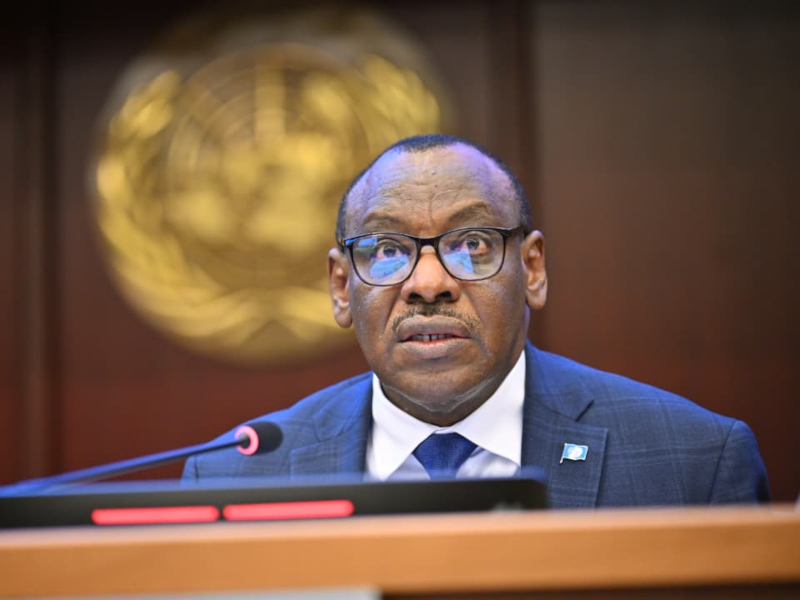Fourth Session of the Committee on Private Sector Development, Regional Integration, Trade, Infrastructure, Industry and Technology
Theme:
“Leveraging frontier technologies and innovation to advance regional integration for sustainable and inclusive growth”
Statement
By
Mr. Claver Gatete
United Nations Under-Secretary-General and
Executive Secretary of ECA
UNCC, Addis Ababa, Ethiopia
18 November 2025
Mr. Mamadjam Dinis Djalo, Directeur Du Cabinet du Ministre, Guinea-Bissau (Chair of the outgoing Bureau),
Distinguished Ministers,
Partners and Experts,
Colleagues,
Ladies and Gentlemen:
I am delighted to welcome you all to the Fourth Session of the Committee on Private Sector Development, Regional Integration, Trade, Infrastructure, Industry and Technology being convened under the important theme: “Leveraging frontier technologies and innovation to advance regional integration for sustainable and inclusive growth.”
In particular, I wish to express deep appreciation to Mr. Mamadjam Dinis Djalo, Chair of the outgoing Bureau, for his dedicated leadership and valuable stewardship of the Committee over the past cycle.
Excellencies,
Distinguished Delegates:
We meet at a time when global developments are being shaped by rapid technological shifts, rising geopolitical tensions, tightening financial conditions and the intensifying impacts of climate change.
These converging forces are reconfiguring the global economic terrain, often deepening vulnerabilities and widening inequalities.
And Africa finds itself squarely at the center of this transformation.
In fact, our continent continues to confront constrained fiscal space, uneven access to cutting-edge technologies, climate-induced losses and the persistent challenge of fragmented markets.
But Africa also possesses assets that few regions can match.
It has the world’s youngest population, abundant renewable energy potential, rapidly expanding digital ecosystems and, critically, a continental market of 1.4 billion people under the AfCFTA.
This invites a critical question: How can Africa change from being shaped by global forces to shaping those forces themselves?
The answer is straightforward: integration and innovation must move together.
One without the other limits our potential; but together, they can redefine Africa’s place in the global economy.
Indeed, the evidence is compelling.
Across the continent, innovators are applying technology to Africa’s unique challenges – mobile money transforming financial systems, drones delivering medicine to remote communities and digital platforms driving new efficiencies in agriculture and commerce.
Generative AI alone could raise global productivity by up to 40% annually.
If Africa can capture even 5% of that value, it will translate into more than US$220 billion each year, the equivalent of adding a new mid-sized African economy annually.
However, technology cannot thrive in isolation.
Innovation needs scale, and scale requires integration.
This is where the AfCFTA becomes indispensable.
A unified African market creates the demand volumes, investment incentives and harmonized regulations required for frontier technologies to scale.
Meanwhile, innovation is accelerating integration itself.
Africa’s instant payment systems have grown by nearly 40% between 2019 and 2023, reducing transaction costs and bringing our markets closer together.
This mutually reinforcing relationship – integration fuelling innovation, and innovation accelerating integration – is the opportunity before us.
As today’s programme will demonstrate, from regional value chains to frontier tools, from energy systems to transport networks, the issues before us constitute the practical foundations of Africa’s future competitiveness.
And so, what must we do, together, to turn these opportunities into concrete results?
Allow me to offer three recommendations.
First, we must build the enabling infrastructure – digital and physical – that allows technology to scale across borders.
Africa must invest in interoperable digital ID systems, cross-border data centers, regional broadband corridors and modern logistics networks.
These systems are the backbone of innovation-powered integration.
Second, we must empower Africa’s private sector, especially youth and women, to drive innovation and value creation.
No country has industrialized without a vibrant private sector.
We must mobilize affordable capital, build resilient innovation ecosystems, expand regulatory sandboxes and enable SMEs to grow within continental value chains.
Third, it is imperative that we accelerate coherence and harmonization in regulatory and policy frameworks.
Africa cannot maximize the AfCFTA’s benefits if innovators must navigate 54 different regulatory environments.
To this end, we must fast-track convergence on digital trade standards, investment rules and data governance.
Excellencies,
These priorities make one thing clear: Africa is not beginning from a blank slate.
Across the continent, our member States are already deploying frontier technologies, implementing reforms and building regional systems that embody our shared vision of a resilient, integrated and forward-looking Africa.
Let me assure you that ECA remains fully committed to walking this journey with you by providing actionable data, evidence-based policy insights, technical support and close partnerships with the African Union, the Regional Economic Communities, the private sector and our development partners.
As we begin this fourth session, I encourage us to share candidly the lessons from our own countries and translate today’s dialogue into concrete cooperation and measurable outcomes that will shape the Africa we want.
I thank you, and I wish you productive, forward-looking and impactful deliberations.
